- Home
- J. D. Rhoades
The Devil's Right Hand Page 5
The Devil's Right Hand Read online
Page 5
There was a muffled beeping noise from the handbag hung over one of the kitchen chairs. “Shit,” Crystal said. “What time is it?”
Leonard looked at the clock over the stove. It was stopped. “Ahhh...about five-thirty,” he guessed.
Crystal swore under her breath. She pulled a small black beeper out of the purse and looked at the screen. She shook her head. She picked an old-style rotary phone up off the floor next to the table and dialed.
“Yeah, it’s me,” she said. She listened for a moment. “I can’t tonight,” she said. “I got company.” There was a burst of angry speech on the other end. “No, no, it’s notI’m not she was having trouble getting a word out. Finally, the voice on the other end said something that caused her eyes to widen. “Okay,” she said. “Okay, I’ll be there as soon as I can. I just got up. I will. I will, I promise.” She hung up the phone and looked off
into the distance for a moment, chewing her lower lip. “I gotta go,” she said, and stood up. “I gotta go to work.”
Leonard and DeWayne looked at each other. “Hey, Crys,” DeWayne said finally, if your boss is givin’ you any trouble, we can, you know...”
“No, no,” she said. “It’ll be alright. It’s okay. They’re just-- short-handed.”
“At a titty bar?” DeWayne said.
Her eyes narrowed and snapped around to bear on DeWayne. “You mind your own damn business, DeWayne, you hear?”
Both of the men put up their hands. “Easy, Crys, take it easy,” Leonard said. He used the soothing tone of voice he had developed through years of intercession between his sister and their cousin. Crystal got up and walked out of the kitchen.
“The fuck’s eating her?” DeWayne wondered. Leonard shrugged. “Whatever,” he said. “We need to get us some food. And we’re outta beer.” He stood up, put his hands in the middle of his back and stretched. “Gettin’ too old for this shit,” he muttered. He walked into the living room, with DeWayne following.
The old farmhouse was in the middle of what John Lee referred to as “Bum-fuck Egypt.” It fronted on a narrow two-lane road and was surrounded on the other three sides by tobacco fields. An enormous oak tree dominated the front yard. A row of crepe myrtle obscured the lower half of the screened in porch that ran along the front of the house. The crepe myrtle was beginning to bloom, with long strings of bright-red and pink flowers bowing down the branches with their weight. The thick greenery had been allowed to grow long, so that the screen door in the center seemed to peek out from a flowered jungle.
As the truck pulled into the driveway, an old man came to the door. He was of medium height, with white hair that stuck out in unruly tufts from beneath an ancient gimme cap from a long-defunct seed company. The cap was as lined and creased as the hand that rested on the jamb of the screen door, holding it half-open as the man waited. In contrast, the old man’s bib overalls seemed brand new, with a knife-edged crease in the pants.
“Stay here,” Raymond muttered. John Lee nodded once. Sanchez looked worried.
Raymond got of the truck and walked towards the old man, smiling like a door-to-door salesman. “Hep you?” the old man said as he approached. His voice was neutral, but his eyes flickered warily between Raymond and the two men in the truck. A Latino traveling with a pair of Indians was an unusual sight outside of the realm of manual labor. People tended to stick with their own kind. Raymond was too well-dressed for picking cotton or priming tobacco.
“Nice farm,” Raymond said, still smiling.
“Ain’t mine no more,” the old man said. “Got too old to work it. Had to sell ever’thing but the home place.”
Raymond nodded. “That’s too bad.” The old man said nothing. “DeWayne around?” Raymond asked.
The old man’s face seemed to close up, as if steel shutters had suddenly dropped down across it. “He ain’t here. He an’ Leonard done took off somewheres. Ain’t seen him in a couple weeks.”
Raymond had arrived at the door. He slowed down rather than stopping, crowding the old man until he stepped back out of the doorway. Raymond replaced the old man’s hand on the door with his own. The old man looked at the rings on Raymond’s fingers and back to his eyes, which were obscured behind his tinted glasses. The old man swallowed nervously. “He ain’t here,” he repeated in a smaller voice. Raymond continued to shuffle forward, forcing the old man to retreat farther into the cool darkness of the screened porch. “We kinda need to talk to him,” Raymond said. “It’s about a job he applied for.” He put a hand on the old man’s shoulder and turned him slightly, guiding him into the house. John Lee and Sanchez saw the door close behind them.
“What is he doing?” Sanchez asked.
John Lee shrugged. “Gonna ask him where this Puryear guy might’ve gone, I reckon.”
Sanchez shook his head. “I don’t like this,” he said. “What will he--”
“Don’t worry,” John Lee said. “Nobody’s gonna do anything. Just relax.”
Sanchez looked at the house. His brow furrowed. “Your brother is a dangerous man,” he said. “He is a narcotraficante, a smuggler, no?”
John Lee’s eyes went cold. “Where’d you hear that?”
“Your father, he worried about this,” Sanchez replied. “Sometimes I heard him talking on the phone about how worried he was.”
“And what the hell business was that of yours?” John Lee said.
“I have sons,” Sanchez said. “In Colombia. I know what it is to worry. I felt bad for him.”
“Well, he don’t worry no more,” John Lee said. “And you don’t worry neither. You just mind your business.”
“If I was minding my business,” Sanchez pointed out, “I would not be here.” John Lee had no answer for that.
They sat in silence for a long while. Sanchez watched the front door. It was late afternoon and the shadows were beginning to deepen beneath the trees.
There was a sound from inside the house, a wordless cry of pain. Then a sharp bang.
Sanchez jumped, sitting up straight in the seat. He looked around frantically. “Que? Que pasa?” he said. “What is happening?”
“Nothing,” John Lee said, but his own agitation robbed the words of all calming effect. He drew his pistol from beneath the seat. He slid over to the driver’s side door and started to open it. There was another cry, then a sound like someone weeping. John Lee stopped, half in and half out of the open door of the truck. A louder wail came from the house, an unmistakable sound of pure agony and despair.
“Do something!” Sanchez cried. He reached for the door handle. John Lee swung the pistol to bear on Sanchez. “You stay there!” he said. His voice shook, but Sanchez heeded the message of the gun rather than the sick look on John Lee’s face. The two men stared at each other, each straining their ears, wanting to hear what was happening and desperately afraid of the what the next sound would bring. The silence roared in their ears for what seemed like hours. Another flat bang, then the faint sound of a voice. It was pitched high and fast, with a note of desperation. Then there were two more bangs and the silence closed down again.
After a few minutes, Raymond came out of the house. He was folding a torn piece of paper. He put the paper in his jacket pocket. John Lee and Sanchez noticed the pistol was stuck in his waistband.
John Lee slid back over to the middle of the seat as Raymond got in. Sanchez was staring at him, eyes wide.
“What happened?” John Lee asked.
“Nothin’,” Raymond said. He drew the gun out of his waistband, laid it on the seat between himself and John Lee. “Found out he has a sister in Fayetteville. We’ll try there.” He patted his jacket over the pocket. “I got her address.”
“How did you get the address?” Sanchez demanded. “What did you do?”
Raymond smiled. “I asked. Nicely. But I had to ask a few times.” He started the truck.
Sanchez shook his head. “No. This is not right. This is not what I agreed.” His accent had become thicker wit
h agitation.
Raymond put the truck back in park and looked at Sanchez. His face was expressionless. “You want out, you can get out here.”
Sanchez looked at the pistol on the seat. He swallowed hard. After a few moments, he looked into Raymond’s eyes. He saw there what would happen to him if he got out of the truck. He shook his head again. “No. I stay.”
Raymond smiled again. “That’s what I thought,” he said. He started the truck and drove off.
DeWayne leaned over the mirror with the intense focus of the truly wasted. He stuck the rolled up twenty into his left nostril and slowly hoovered up the first of the thick white lines laid out on the mirror. Then he switched nostrils and did the other one. He straightened up, threw his head back, and howled like a dog.
“God Damn it, DeWayne,” Crystal’s voice came from the next room. “I told you to keep quiet.”
“I feel good, da-da-da-da-da-da-da,” DeWayne sang. “I knew that I would, y’all--”
“Hey, James Brown,” Leonard said. “Shove that mirror over here.” DeWayne obliged him, placing the small bag of cocaine on the mirror. “Man,” he observed. “This is some good shit.”
Crystal came out of the bedroom, dressed in a plum-colored low-cut dress. Her mouth dropped open in shock at the sight of DeWayne and Leonard demolishing her stash. Her face turned red with anger. “What the hell do you two think--”
“Easy, Crys,” Leonard said. He pulled the fat roll of bills out of his shirt pocket and waved it at her. “We gotcha covered,” he grinned.
She looked at the cash, suspicion and avarice warring for possession of her face. “How much of that do you still have left?” she demanded.
“Less you know, little sister,” DeWayne said, “the--.ahhhh--less you know.” He giggled.
“More’n that in this here bag, darlin’,” Leonard promised, holding up the money bag. “Think you could get us some more o’this good toot?”
“Yeah,” Crystal said, her eyes still fixed on the bag. She tore her eyes away and smiled at him. “I gotta run a couple of other errands first though.”
“Ain’t you gonna be late for work?” DeWayne said.” You been in there an hour.”
She laughed. It was a bitter, humorless sound. “They’ll wait,” she said. “They always do.” She held out her hand and Leonard counted off several bills into it with the flourish of a king rewarding a favorite courtier. “We need some more beer, too,” he said.
Crystal nodded. “I’ll be a couple hours,” she said. She picked up her purse and walked to the door. “For Chrissakes, try to stay quiet.” As she walked out, she pulled a cell phone out of her purse. Leonard went to the window to watch her go. He saw her talking on the phone as she walked to the car.
“We oughta eat somethin’,” DeWayne suggested. “How ‘bout we order a pizza?”
Leonard thought it over. It seemed reasonably safe. “Yeah, all right,” he said. He picked up the phone.
“And see if they’ll bring us some more beer,” DeWayne suggested. “I don’t feel like waitin’ two hours for Crystal to get back. I got a thirst.”
Leonard sighed. “They don’t do that, DeWayne,” he said. “You can’t get no one to deliver beer.”
“Shee-it, cuz,” DeWayne replied. “One thing I know, people’ll do damn near anything if the money’s right.”
Leonard picked up the phone.
Keller pulled over and parked halfway down the block on the dead-end street. He noticed a rusted pickup truck parked in front of the white house. The truck had not been there when he had checked the house out before. He didn’t recognize the truck or the license plate as any of the ones that Angela had supplied him with as being registered to DeWayne Puryear. The truck could have belonged to any resident of the street. Still, Keller felt his heart quicken. There was no logic to it, he knew, but some instinct made the hair stand up on the back of his neck. He took a second to savor the anticipation. The takedown was just moments away. The adrenaline began to course through him, singing in his bloodstream. It was the reason he did the job. He reached for the cell phone. As he picked it up, it buzzed softly. He silently thanked the reflex that had caused him to turn the ringer off and set the phone to “vibrate.” The sudden quivering sensation, however, made the phone feel like some small and frightened animal in his hands.
“Keller,” he said softly into the phone.
“Where the hell have you been?” Angela’s voice demanded. Her voice sounded strained. There was none of the usual banter.
“Sorry,” he said, still almost whispering. “Turned the ringer off. And I had to run a few errands.” He looked at the truck. “I need you to run a plate for me.”
“In a minute,” Angela said. “You need to hear this. DeWayne Puryear’s parents have been killed.”
Keller tensed. “When?”
“A few hours ago. Both of them, shot in the back of the head. Execution style. It was on the radio.”
“They think he did it?”
“No.” her voice was shaky. “I know a couple of people on the Sheriff’s department down there, so I made some calls. I got a couple of details that weren’t on the news.” He heard her take a deep breath. “They think the father had been tortured. The fingers on his left hand were broken, like somebody bent them back till they snapped.”
Keller winced. “Any idea why?”
“There was some money stashed in a coffee can under the sink, so that’s not what they were looking for.”
Keller thought for a moment. “DeWayne? They think someone else is looking for him?”
“They know he’s on the run. And they know H & H made his bond.” She took a deep breath. “The person I talked to was real interested in where you were.”
“Wait a minute,” Keller said. “They think I had something to do with this?”
“They said they just wanted to talk to you. See if you knew anything.”
“I hope you told them that I wasn’t going to commit murder over a ten percent recovery fee for a fifty thousand dollar bond.”
“They never outright accused you. There was nothing for me to deny. Like I said, they claimed they only wanted to talk to you.”
“Damn it,” Keller said. “This I don’t need.” He drummed his fingers on the steering wheel. “You tell then where I was?”
Her voice was hurt. “Of course not.” She paused. “Keller, something’s screwy here. There’s somebody else out there who wants to find DeWayne Puryear. Somebody willing to torture a seventy-year old man to find out where he is and then kill him. I want you off this job. Call the local cops and let them handle it. It’s not worth it.”
He looked back at the pickup truck. “It is to me.”
“You just said you weren’t going to kill someone over five grand. Now you’re telling me you want to die for it?”
“I took the job. I want to finish it.”
“What are you, the Mounties all of a sudden? You always get your man?”
“Yeah,” Keller said. “That must be it.”
“Damn it, Keller,” she said. “Call the cops and let them handle it.”
“I’m not exactly fond of the local constabulary right now. Besides, if the cops bring him in, you still going to pay me for it?”
There was a brief pause. “Would you take it if I did?”
“No.”
Angela made an exasperated sound that sounded almost like a growl. “Jesus,” she said. “It’s not the money. You’ve just got the worst case of testosterone poisoning in human history. You ought to have your head examined, Keller, you know that?”
“I tried that,” he said. “It didn’t work. You going to run that plate for me?”
He heard her sigh, heard the click of computer keys. “Go ahead.”
He gave her the license number. He heard the keys clicking again, then silence as she waited. He wished she would say something. She didn’t. Finally, she spoke.
“Vehicle is a 1987 Ford Pickup registered to one Leonard Pur
year,” she said. Her voice was flat.
“DeWayne’s cousin,” Keller said.
“Yeah. Where’s the truck?”
“It’s parked at that address you gave me. Crystal Puryear’s house." He smiled. “Jackpot.”
She sighed. “Yeah. Jackpot.”
“Maybe it’s a family reunion,” he said. He wished she would make a joke back.
“Yeah,” she said. “Except for Mom and Dad.” There was a short pause. “Just be careful, Jack,” she said.
“I will,” he said, but she had already hung up.
Keller glanced over at the stubby black shotgun nestled in the rack by the seat. Re-arming himself had not been a problem. Fayetteville was a military-base town. There were a hundred pawnshops where a man with a valid credit card could buy enough guns to outfit a platoon. It had taken Keller only an hour or so to find a weapon that suited him, a Mossberg 500 “cruiser” model combat shotgun with a shoulder rig, no stock, and a barrel short enough that it flirted with the edge of legality. Keller had modified the weapon by covering the hard plastic pistol grip with a rubberized one; other than that, the lethal little shotgun had been good to go. Though Keller always carried a handgun, he preferred a shotgun for takedowns. There was something about the unmistakable sound of a pump shotgun being cocked that made even the most hardened criminal think twice. A handgun carried more ammo and had a faster rate of fire and reload, but Keller was going to try to stay out of any situation where that would be a factor. “Wanted Dead or Alive” was a concept that had long passed out of vogue.
Handcuffs and restraints had been another problem. There were a couple of stores in town that sold police gear, but they had gotten sticky in the last few years about selling to people without law enforcement or government credentials. Keller didn’t have the time or the cash to persuade them that bail enforcement would fit the mold, despite the lack of official standing. He had settled for stopping by a hardware store and purchasing a roll of duct tape. Crude and messy, but effective. He sighed. At least they hadn’t thought to pull the police scanner out, or they hadn’t had time. The numbers pulsed fluorescent green across the front screen of the scanner slung beneath the dash, running rapidly through the freqs he had obtained for the local cops. There was only the occasional squawk of static and brief burst of clipped chatter as the various cars checked in with the dispatcher. It was a quiet night.

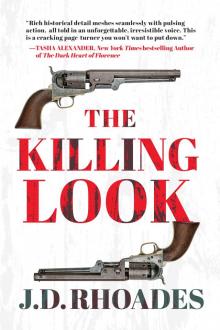 The Killing Look
The Killing Look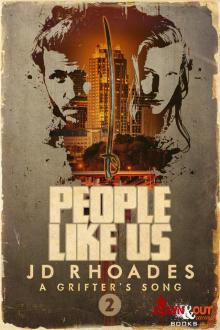 People Like Us
People Like Us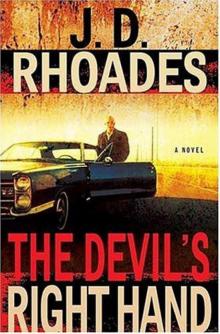 Jack Keller - 01 - The Devil's Right Hand
Jack Keller - 01 - The Devil's Right Hand Safe and Sound
Safe and Sound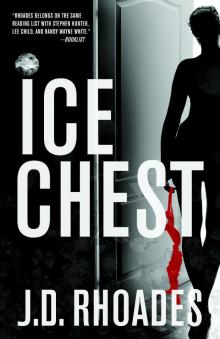 Ice Chest
Ice Chest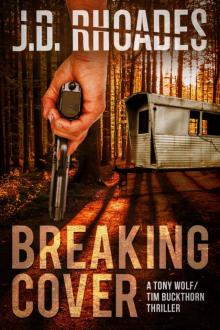 Breaking Cover
Breaking Cover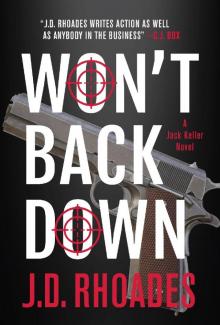 Won't Back Down
Won't Back Down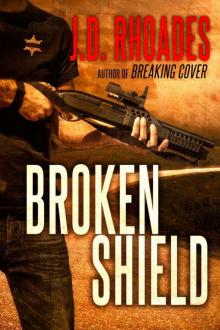 Tony Wolf/Tim Buckthorn - 02 - Broken Shield
Tony Wolf/Tim Buckthorn - 02 - Broken Shield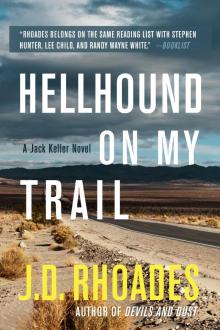 Hellhound On My Trail
Hellhound On My Trail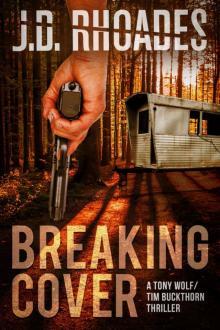 Breaking Cover (Tony Wolf/Tim Buckthorn)
Breaking Cover (Tony Wolf/Tim Buckthorn)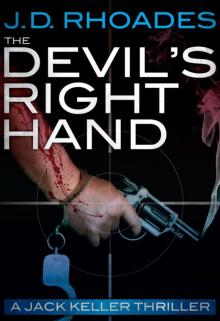 The Devil's Right Hand
The Devil's Right Hand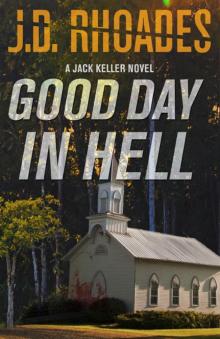 Good Day In Hell
Good Day In Hell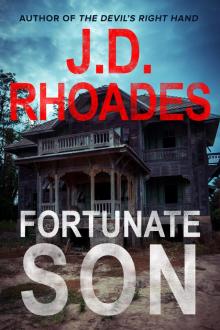 Fortunate Son
Fortunate Son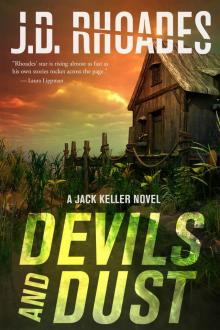 Devils and Dust
Devils and Dust